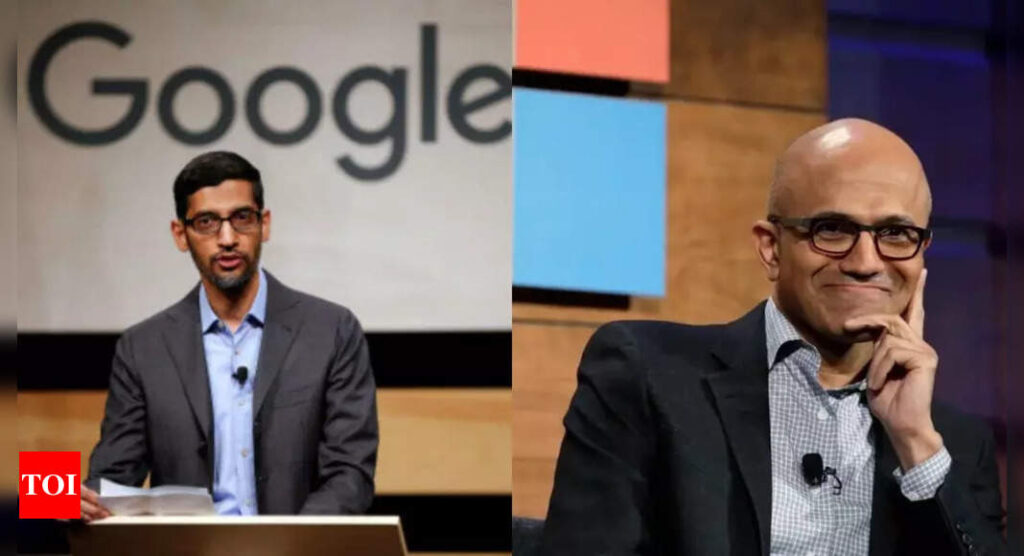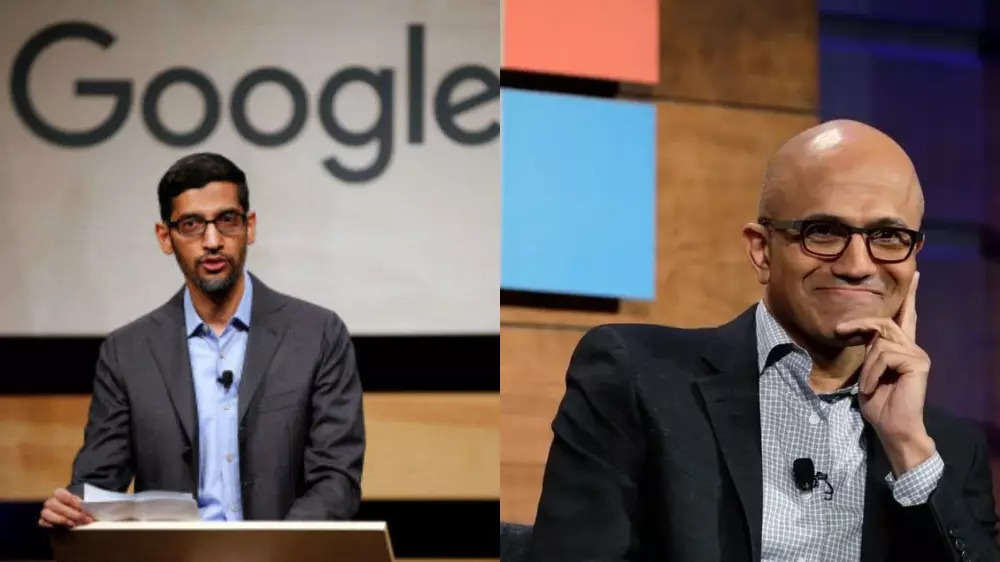[ad_1]
WASHINGTON: On the face of it, they are the face of global India, two of the most iconic name the country have given to the tech world. Often spoken of in the same breath and regarded as two sides of the same coin from the Indian educational mint, they are now, at best, frenemies. The companies they head are rivals in many ways, and in a federal courtroom in Washington DC on Monday, their competition and antagonism came to the fore as Microsoft CEO Satya Nadella, lit into Google, which is headed by Sundar Pichai.
Testifying at an anti-trust trial brought against Google by the federal government, Nadella never once took Pichai’s name, but skewered the tech giant (even though Microsoft is bigger in terms of market cap $2.38 trillion vs $1.69 trillion), saying Google’s dominance of online search is making it harder for competitors like Microsoft’s Bing to gain a foothold because the Silicon Valley giant uses its power to monopolize publishers and advertisers. Microsoft is headquartered in Redmond, Washington, outside Seattle.
“Everybody talks about the open web, but there is really the Google web,” Nadella said from the stand in the Washington, DC, District Court where the presiding judge, incidentally, is another Indian-American — Amit Mehta, who was both in Patan, Gujarat. Google, Nadella maintained, could now use its advantage and scale to build tools to dominate the emerging artificial intelligence industry, where Microsoft has jumped ahead with its ChatGPT.
The trial is the biggest anti-trust action brought against a tech company by the Justice Department since Microsoft itself was in the dock some 25 years over the dominance of its Windows operating system. At the heart of the government’s case is the accusation that Google is extending its monopoly of online search by paying to be the default option on browsers like Apple’s Safari, including on the home screen of smartphones.
Google’s power and search dominance is most evident in its multibillion-dollar agreement with Apple that makes Google search the default option on iPhones, which dominate the US market. Google maintains that users can switch to a new search engine if they like the default option.
That argument, Nadella countered, is “bogus” because users generally don’t change their default search engine even if there an option. “You get up in the morning, you brush your teeth and you search on Google,” he said.
Microsoft and Google have been duking it out on various tech fronts — from online search to web browsing to mobile and cloud computing — for more than two decades, pre-dating Nadella and Pichai heading the companies. Artificial intelligence is the latest frontier, and Nadella, who jumpstarted the race by introducing AI into Microsoft’s Bing ( triggering Google response in the form of Bard), was clearly worried about Google using its search clout to catch up and move ahead.
“Despite my enthusiasm that there is a new angle with A.I., I worry a lot that this vicious cycle that I’m trapped in could get even more vicious,” he said. Pichai is also expected to testify at the trial in the coming days in what is being described in some quarters as a “big tech cage fight.”
The two Indian-Americans, who hail from Hyderabad and Chennai respectively and went to different engineering schools in India (Nadella, 56, is alumnus of Manipal Institute of Technology) and Pichai, 51, is from Indian Institute of Technology, Madras), are not exactly close friends. But they have been courteous to each other in public and in a few social media exchanges.
In fact, when Steve Ballmer stepped down as Microsoft CEO in 2014, Pichai, then heading Google’s Android among other divisions, was among the names circulating to succeed him. But Nadella, a Microsoft insider, got the nod. A year later, Pichai was catapulted as Google CEO.
Testifying at an anti-trust trial brought against Google by the federal government, Nadella never once took Pichai’s name, but skewered the tech giant (even though Microsoft is bigger in terms of market cap $2.38 trillion vs $1.69 trillion), saying Google’s dominance of online search is making it harder for competitors like Microsoft’s Bing to gain a foothold because the Silicon Valley giant uses its power to monopolize publishers and advertisers. Microsoft is headquartered in Redmond, Washington, outside Seattle.
“Everybody talks about the open web, but there is really the Google web,” Nadella said from the stand in the Washington, DC, District Court where the presiding judge, incidentally, is another Indian-American — Amit Mehta, who was both in Patan, Gujarat. Google, Nadella maintained, could now use its advantage and scale to build tools to dominate the emerging artificial intelligence industry, where Microsoft has jumped ahead with its ChatGPT.
The trial is the biggest anti-trust action brought against a tech company by the Justice Department since Microsoft itself was in the dock some 25 years over the dominance of its Windows operating system. At the heart of the government’s case is the accusation that Google is extending its monopoly of online search by paying to be the default option on browsers like Apple’s Safari, including on the home screen of smartphones.
Google’s power and search dominance is most evident in its multibillion-dollar agreement with Apple that makes Google search the default option on iPhones, which dominate the US market. Google maintains that users can switch to a new search engine if they like the default option.
That argument, Nadella countered, is “bogus” because users generally don’t change their default search engine even if there an option. “You get up in the morning, you brush your teeth and you search on Google,” he said.
Microsoft and Google have been duking it out on various tech fronts — from online search to web browsing to mobile and cloud computing — for more than two decades, pre-dating Nadella and Pichai heading the companies. Artificial intelligence is the latest frontier, and Nadella, who jumpstarted the race by introducing AI into Microsoft’s Bing ( triggering Google response in the form of Bard), was clearly worried about Google using its search clout to catch up and move ahead.
“Despite my enthusiasm that there is a new angle with A.I., I worry a lot that this vicious cycle that I’m trapped in could get even more vicious,” he said. Pichai is also expected to testify at the trial in the coming days in what is being described in some quarters as a “big tech cage fight.”
The two Indian-Americans, who hail from Hyderabad and Chennai respectively and went to different engineering schools in India (Nadella, 56, is alumnus of Manipal Institute of Technology) and Pichai, 51, is from Indian Institute of Technology, Madras), are not exactly close friends. But they have been courteous to each other in public and in a few social media exchanges.
In fact, when Steve Ballmer stepped down as Microsoft CEO in 2014, Pichai, then heading Google’s Android among other divisions, was among the names circulating to succeed him. But Nadella, a Microsoft insider, got the nod. A year later, Pichai was catapulted as Google CEO.
“Congrats @sundarpichai well deserved!” Nadella tweeted on August 10, 2015. “@satyanadella thanks for the wishes:)” Pichai responded.
[ad_2]
Source link











More Stories
We can’t wait to face India in the final: Pat Cummins | Cricket News
Railways plans 3,000 additional trains in next 4-5 years to minimise number of waitlisted tickets | India News
Faridabad: Man dies after ‘falling from hotel room window’ while partying with friends